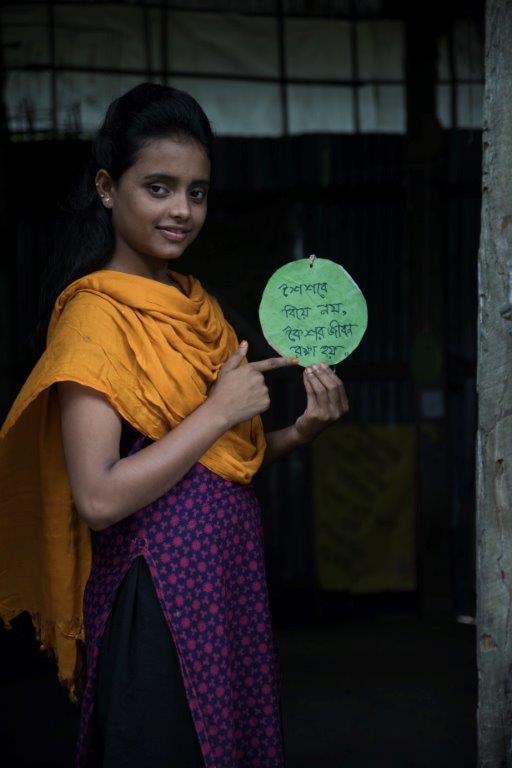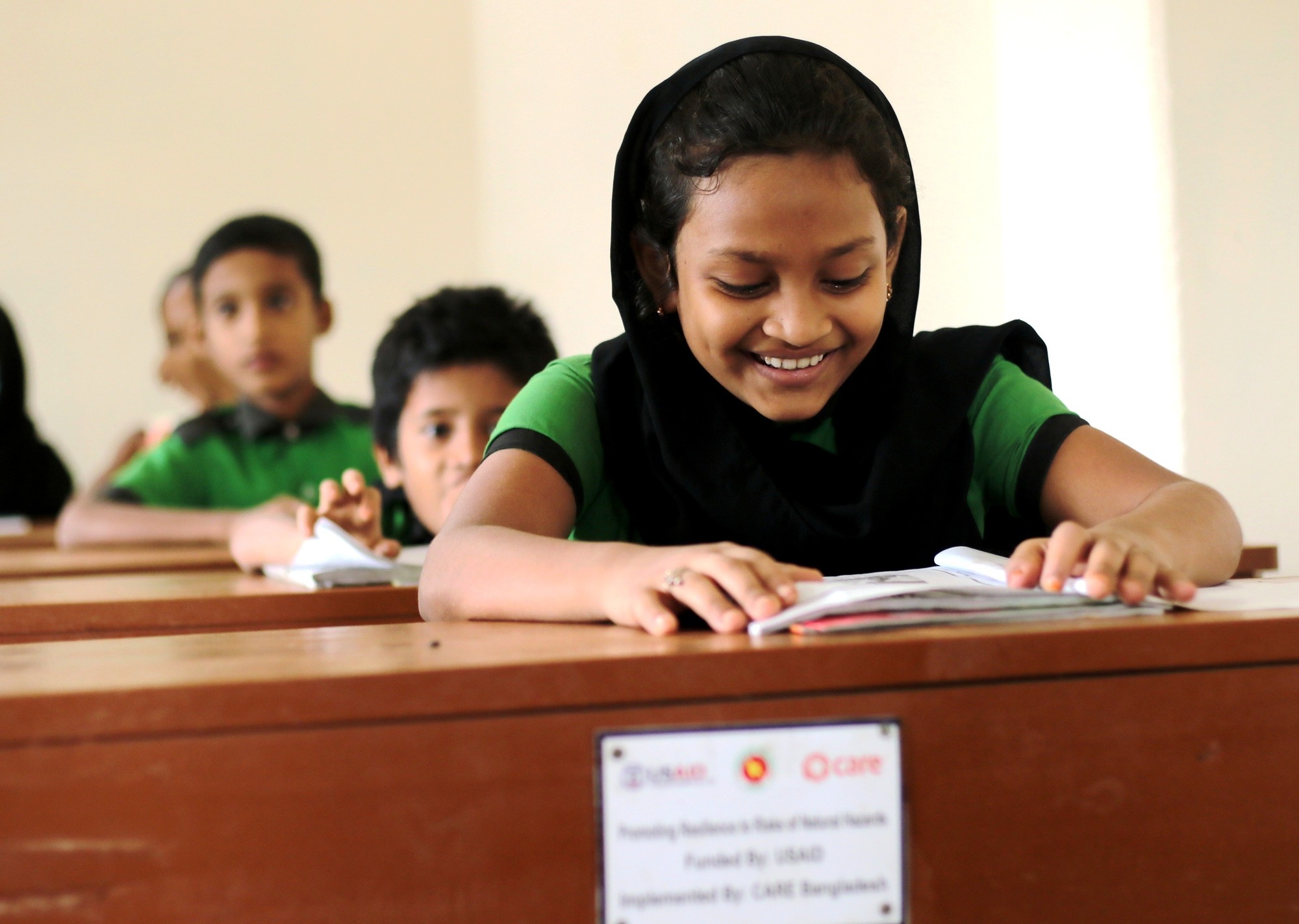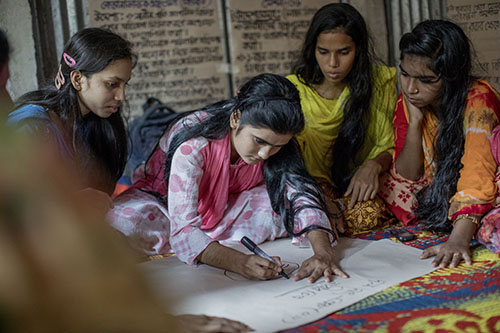
Project participant under Tipping Point Initiative, Photo: Parvez Ahmed, CARE Bangladesh
It is hard to believe that Bangladesh still has some of the highest rates of child marriage worldwide. More than half of all girls in Bangladesh get married early before the legal age of 18. For most, it is not a choice; societal norms and various socio-economic conditions play a key role in determining the fate of young girls. Child, Early, and Forced Marriages (CEFM) deprive women and girls of equal opportunities and fundamental human rights. It threatens their lives and future and takes away their right to education, making them more vulnerable to violence and abuse while restricting their opportunity to make decisions and choices for themselves and their families. Early marriage often leads to early pregnancy and childbirth, resulting in higher mortality and morbidity rates. The consequences and negative impacts of CEFM are long-lasting, preventing our sustainable development and prosperity goals for the nation.
For the past 72 years, CARE Bangladesh has been working side by side with the people of Bangladesh to combat poverty and achieve social justice. Our work centers around women and girls because CARE's core belief is that poverty cannot be overcome until everyone has equal rights and opportunities, and women and girls make up for more than half of the global population. Our work in Bangladesh ranges from supporting maternal health and well-being, food and nutrition, poverty eradication, emergency response, disaster mitigation, and more, with a core focus on women empowerment integrated into each of our programs.
CARE’s approach to addressing social norms for ending child, early and forced marriages is unique and impactful. Addressing the root causes of CEFM is central to CARE’s work so that women and girls are able to achieve social and economic justice, receive opportunities to make informed choices, and have opinions on their lives and livelihood. In Bangladesh, we are currently working across multiple projects to prevent early and forced marriages.
Sadly, with the onset of the COVID-19 pandemic, early and child marriages have increased in Bangladesh, taking us a few steps back in progress we made in the past few years. Whilst there have been years of high-level engagement from the Government as well as various policy frameworks and grass root level interventions to combat CEFM, it is now more urgent than ever to raise awareness, create community-based solutions and social movements in addition to macro and meso-level advocacy initiatives to protect some of the gains that have been made over past decades.
Although we see progress and development in terms of GDP, infrastructure, technology, connectivity, as well as increased presence and participation of women and girls in the socio-economic spheres in some sectors; however, the stories that we hear from young women and girls from our projects in different parts of the country, still depict a picture of significant inequalities and deprivation. We listen to accounts of the real-life battles some young girls face in their daily lives and how they manage to overcome these hurdles with support and interventions from different institutions, organizations, or individuals. As we celebrate International Women’s’ day on March 8, reflections of CARE‘s work on CEFM bring us back to the purpose of our work, with women and girls at the center of our mission and goal.
Bright school-going Taslima shared, “A simple river crossing separated me from a life of education and living my dreams of being married at a young age.” A student of grade nine of Koikuli village, Taslima was on her way to achieving one of her life’s first and most significant milestones, her SSC exams. She has a brother who avails tuitions to help him improve his grades. He crosses a river to go to his after-school tuitions but being a girl, Taslima is not allowed to go there, despite being at the final stage of her studies and requiring further assistance to prepare for the big exam. She has repeatedly explained the need for additional help to her parents, but given the circumstances, they had decided to marry her off as soon as she graduated from grade nine. They further made her feel neglected and distanced by providing their son with a mobile phone.

Every girl has right to complete their basic education.
Photo: Asafuzzaman, CARE Bangladesh
Taslima’s mother was a member of the Mothers’ Group formed by CARE, and through sensitizing sessions, she realized the adverse effects of marrying girls at an early age and soon realized her mistakes. She gave Taslima permission to attend these tuitions across the river and gave her a new phone as well. The siblings now go for after-school lessons together, and Taslima is already planning her studies post her SSC exams. We came across Taslima and others like her through CARE’s Tipping Point Initiative. This multi-country project addresses the root causes of CEFM by centering girls’ experiences and evidence-based strategies to facilitate transformative change. We work alongside and support movements that seek to expand adolescent girls' voices, choices, agency, and rights. Tipping Point is also working to build on the growing body of evidence and programmatic experience from all the implementing phases to influence positive change on girls’ rights and CEFM alongside donors, governments, and peers.
Some of our activities entail working with communities to influence and encourage women and girls to fight for preventing CEFM. The key approach here is to empower the women and girls with the right knowledge and messages so that they become their own advocates to fight for their rights. Nasima, an adult female community group member from IMAGINE project in Jigatola, Lengua, Kalmakanda, Netrokona, shared, “In our village, we prevented a 14-year-old girl's marriage. We formed a group with 4/5 members from the adult female group and 2/3 members from the adult male group when one of our group members heard about the potential incidence of child marriage. Then we went to the victim's house and met with the father of the girl child. We discussed the risks of child marriage and advised the parents not to marry off their adolescent daughter. We also warned them that we would report them to the police and Union Parishad if they went forward with the child marriage. Finally, the family decided to postpone the wedding, and the adolescent girl is now completing her studies in a Madrasha (religious school).”

Project participant under IMAGINE project
Photo: Josh Estey, CARE Bangladesh
CARE’s IMAGINE project helps adolescent girls and young women who are already victims of forced marriage to delay the birth of their first child. There were about 60% unmarried girls as members of Girls Collective Clubs (Kishori Clubs). They received awareness-building sessions on sexual and reproductive health rights, gender-based violence mitigation, girls' legal rights, business awareness, entrepreneurship, and future empowerment. Through continuous orientation on these issues, the girls under IMAGINE project became aware and vocal against CEFM and learned to make their own life decisions. The project arranges dialogues in mother groups to raise knowledge on different risks of CEFM marriage and early childbirth so that they would support their daughters in preventing child marriage. By being part of such a discussion, Ayesha’s mother was able to advocate for her well-being to her father which ultimately prevented Ayesha from falling victim to child marriage.
CARE’s flagship project SHOUHARDO III mobilizes hundreds of community groups to take their own initiatives to prevent CEFM. We see youth groups working with the community groups, local leaders, and local government bodies to perform popular theaters that tell real-life stories of the journey and struggles of their mothers, sisters and friends. They are creating slogans like “YOUR MARRIAGE, YOUR CHOICE” and are convincing the local male leaders, fathers, uncles, brothers with support from CARE using our innovative approaches to engage men and boys.
Anwara came from an extremely low-income family and was married off before she was 18. She also shared that her parents were worried about her safety as a young girl and rushed her into marriage. Within five months into her marriage, Anwara became pregnant and now struggling with physical weakness. She shared, “From the very beginning of my marriage, I am struggling with domestic chores and responsibilities assigned to me. My body and soul were not ready to go through these changes and responsibilities so soon.” Such scenarios are often seen as parents do not want to let go of proposals from socially perceived suitable grooms and families, regardless of poverty. Such cases involve grooms who work abroad, hoping for the girls to live a comparatively well-off life. One such case is of Yasmin from Sunamganj. She shared that she got married before she understood anything about married and starting a family. “Back then (in grade 10 when she was married off), I could not protest, and my opinion was also not valued. When I arrived at my in-laws' house, I had difficulty adjusting and had constant conflicts with the new family that I was not ready to deal with family issues.", shared Yasmin.
Being an activist against CEFM is not as difficult as most would perceive. All it takes is a genuine intention ,sincerity and will power. Md. Moksedul Haque, Principal of Thakurdaho High School and College in Rangpur's Gangachara subdistrict, is one such person. Observing the peaking school dropout and increasing child marriage rates, Moksedul knew he had to take an initiative to ensure his students, mostly girls, continue their studies amidst all the adversities that the pandemic brought with it. “We reached out to the families to know about their situation and advocated for continuing their children’s studies. At the same time, we also alerted them about the negative sides of child marriage.”, shared Moksedul. Together with the school’s youth group (chaired by adolescent girls), Moksedul and his college students were able to save the lives of many young girls from a lifetime of suffering. This region of the country is covered by CARE’s JANO project that works with nutrition governance. It is a prime example of how rights-based advocacy and prevention of CEFM is interwoven in all of CARE’s work in Bangladesh.
CEFM is one of the common forms of gender-based violence among the Rohingya community. GBV prevention and response activities through Women and Girls Safe Spaces (WGSS) and at the community level engage men, women, boys and girls, community leaders, and government agencies. Through house-to-house outreach activities, sensitization sessions with the community, Majhi (community leaders), Imam, and Camp-in-Charge, awareness sessions at WGSSs, CARE’s trained GBV team has been raising awareness on GBV, including child marriage, human trafficking, and referrals.
After reaching Cox’s Bazar in October 2017, like many other Rohingyas, Fatema and her family also suffered a lot. Even the path to reaching Cox’s Bazar was full of threats and challenges. Fatema joined CARE Bangladesh’s Women and Girls Safe Space in camp 16, popularly known as Shantikhana. She said, “It was a three days long journey to reach here. On the way, we got mugged and also lost our belongings. Our boat was about to sink in the middle of the river, and we had to throw away all our last belongings to save our lives. That is a horrible experience for me.” She added, “When I started coming to the Shantikhana, I learned to interact with other girls and members of my group. This time is good for me; it helps me forget my bad memories and stay happy.”
Fatema also took part in life skills training and learned sewing. “I learned how to make masks, Baju/Tops/Thami and scarf from the Shatikhana. I can now make my dress with the clothes provided to us. It is great because making clothes does not cost us any money!” shared Fatema. On asking Fatema about the best take away from WGSS, she replied, “Through basic numeracy and literacy sessions, I learned to write my name in English. I am pleased about this. In addition, I also learned about trafficking, the demerits of early marriage, dowry, etc., from the center. I hope to learn more and continue studying."
CARE provides GBV prevention and response services through 14 WGSSs, two Women Help Desks at two police stations, and 18 GBV service centers in Cox’s Bazar targeting Rohingya Refugees and host communities.
CARE also believes in joining forces in the work that we do. For prevention of CEFM, we have formed a coalition with 29 local, national and international women rights organizations under Girls Not Bride Bangladesh secretariat. Through this coalition, the member organizations work together to advance the knowledge base on CEFM, raise awareness on the issues, and campaign for legal and social change. Our aim is to work with organizations at the grass root levels for developing locally-led solutions to combat CEFM and establish the rights of the women and girls in their communities.
CARE strongly believes that true change will only come through equal and equitable participation of all. Sensitizing a single target group is never enough because human beings are not singular beings that function on their own. Human beings live in a complex community with multitude of factors that affect one’s existence in the society. Therefore, when thinking about addressing any social issues, whether positive or negative, it is important to consider all the influential parameters in order to bring and sustain a long-lasting change. It is also a contextual fact that every time there is a family crisis, it is the women and girls that take the fall, beginning with stopping their education to marrying off the girl child, irrespective of her well-being. Through various projects and activities, CARE Bangladesh works closely with the communities to change these societal norms and help them understand the true value of investing in girl child. We are continuously striving to create platforms for adolescent girls and young women to be heard, for their dreams and ambitions to be realized. The success of CARE’s work is rooted in the strong belief, and action-oriented approach that only through women and girls reaching their full potential in life can the root causes of poverty and social injustice can be tackled better.
About: Hasina Rahman is the Deputy Country Director – Program Support for CARE Bangladesh. She is a passionate humanitarian and development worker with a wide range of experience in multi-sector programs and operations. Currently playing an active role in the CARE International Gender Network, she is also a champion for Gender equity, diversity, and inclusion in the organizational work culture and programs. Her experience on Child Early and Forced Marriage (CEFM) work ranges from front-level response work against GBV, safeguarding, and women empowerment to leading advocacy initiatives to establish the voices and rights of women and children.
*Names have been changed to protect identity.

